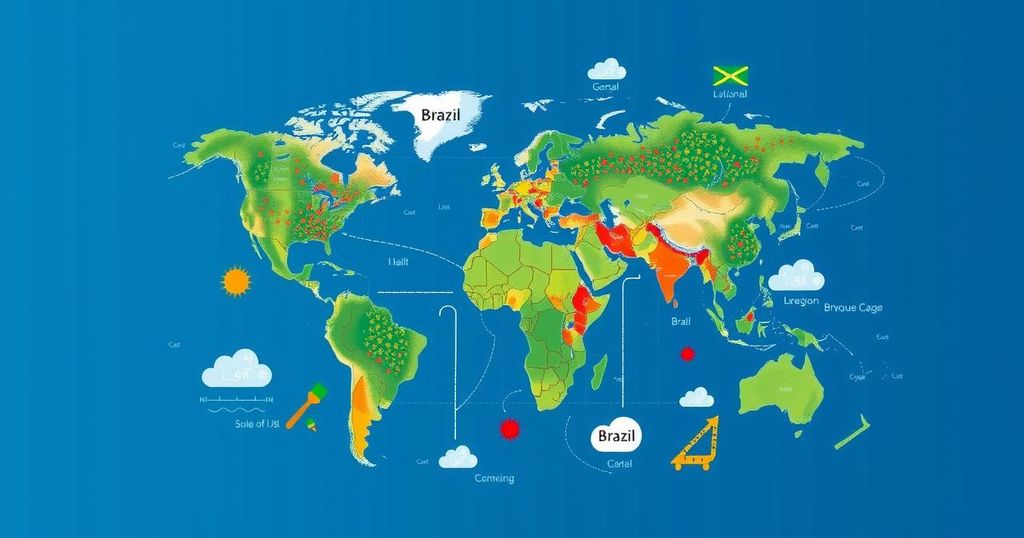The Global Initiative for Information Integrity on Climate Change was launched at the G20 Leaders’ Summit in Brasil to address climate disinformation. It aims to enhance research and coordination among countries and international organizations to combat misinformation while raising funds for related initiatives. Countries like Chile, Denmark, and the UK have already committed to the initiative, emphasizing the urgent need for reliable climate information.
On the final day of the G20 Leaders’ Summit in Brasil, a significant initiative was launched to combat the dissemination of disinformation regarding climate change. The Global Initiative for Information Integrity on Climate Change aims to enhance research and communication efforts to address false narratives that impede climate action. As the urgency of climate challenges escalates, this initiative seeks to not only support accurate information dissemination but also to foster international collaboration. While it was initially developed within the G20 framework, the initiative is evolving into a multilateral partnership involving various states and international organizations. Its focus will be on funding extensive research to explore climate misinformation and its global impact, ensuring that evidence gathered informs and strengthens strategic actions and communication methodologies concerning climate integrity. President Lula emphasized the necessity of collaborative international efforts in mitigating climate denialism and misinformation, stating, “Actions to fight climate change are also greatly affected by denialism and disinformation. Countries cannot tackle this problem individually.” This initiative serves as a crucial platform for uniting nations and researchers in the lead-up to COP30 in Brasil, which will address these concerns in a formal setting. To facilitate this initiative, participating countries will contribute to a fund managed by UNESCO, with aims to raise between $10 million and $15 million over three years. This funding will be allocated as grants to NGOs engaged in research and public communication campaigns about climate information integrity. UNESCO, along with the UN, has become an essential partner in this endeavor, inviting additional commitments from other nations. So far, several countries including Chile, Denmark, France, Morocco, the United Kingdom, and Sweden have pledged their involvement. UN Secretary-General António Guterres noted the urgency of addressing climate disinformation, stating, “We must fight the coordinated disinformation campaigns impeding global progress on climate change.” The Intergovernmental Panel on Climate Change has acknowledged the hindrance posed by disinformation, emphasizing its role in fostering scientific skepticism and diminishing public urgency. Paulo Pimenta, Chief Minister of the Social Communication Secretariat of Brasil, reinforced the need for collaborative protocols to tackle disinformation, highlighting the significance of COP30 in 2025 as a platform for establishing global standards. Audrey Azoulay, Director-General of UNESCO, asserted that without reliable climate information, comprehensive crisis mitigation is unattainable. The initiative aligns with broader commitments to digital integrity as outlined in the Global Digital Compact adopted in September by UN Member States. This initiative represents a proactive measure to enhance the integrity of climate information and combat the pervasive misinformation that threatens global efforts against climate change.
The recent launch of the Global Initiative for Information Integrity on Climate Change comes against the backdrop of rising concerns over disinformation that impacts climate policies and public perception. The need for coordinated international action has become clear, particularly in light of scientific warnings about the escalating challenges posed by climate change. The initiative underscores the critical importance of supportive communication and research to counteract misinformation, which in many instances delays essential climate action.
The Global Initiative for Information Integrity on Climate Change signifies a crucial step towards mitigating the detrimental effects of disinformation on climate action. By fostering international collaboration and funding research and communication efforts, the initiative aims to enhance the integrity of climate-related information. As nations prepare for COP30, the commitment to combat misinformation emerges as a vital aspect of achieving climate goals and ensuring public access to accurate information.
Original Source: www.g20.org






